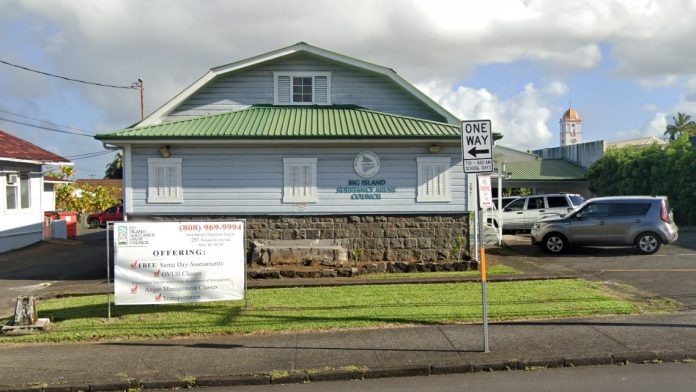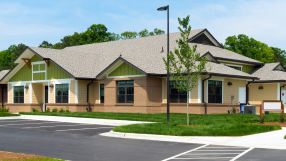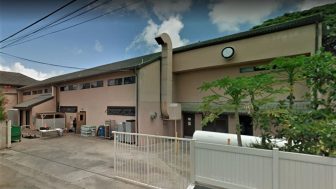Big Island Substance Abuse Council
297 Waianuenue Avenue
Hilo, HI 96720

About Big Island Substance Abuse Council
Located in Hilo, Hawaii, Big Island Substance Abuse Council is a drug and alcohol treatment provider offering residential drug rehab, day treatment, intensive outpatient, outpatient, sober living, counseling, and referrals.
The treatment team at Big Island Substance Abuse Council offers an evidence based treatments and trauma focused approaches to addiction treatment. Clients benefit from a comprehensive assessment and individualized treatment plan, individual and group counseling, case management, structured recovery services, transitional housing, and aftercare support. The program also includes skill development workshops, career support, and mentorship to support individuals to connect to their life’s purpose and their environment.
Big Island Substance Abuse Council is accredited by the Commission on Accreditation of Rehabilitation Facilities (CARF) and licensed by the Hawaii State Department of Health. Insurance plans and self pay are accepted.
Amenities

Beachside
When it comes to addiction treatment, there are some undeniable benefits of attending a rehab with beach views.... For clients who connect with the feeling of sand under their feet, the sounds of ocean waves rhythmically crashing against the shore, and the warmth of the sun on their skin, attending a rehab located on the beach offers a unique form of restoration that only nature can provide.
Private Rehab
Private drug rehab provides a comfortable, secure environment that allows you to focus on doing the work to ge...t your life back on track. Benefits include a higher staff-to-client ratio, increased one-on-one time with therapists and healthcare providers, private rooms for clients, and customized forms of therapy.Addiction Treatment Programs
Adult Program
Men and women over 18 who struggle with substance abuse can receive treatment through an adult program in Hawaii. Programs may include inpatient and/or outpatient care and typically include individual and group therapy methods.Alcoholism
Remission from alcohol use disorder is achieved through effective alcohol rehab in Hawaii. Participants learn how to cease heavy drinking and develop healthy lifestyle habits that lead to long-term sobriety.Cognitive Behavioral Therapy (CBT)
Cognitive behavioral therapy in Hawaii teaches people positive behaviors to replace alcohol and drug use. They learn better ways to cope with negative thoughts and emotions and challenging situations.Men's Rehab
Men’s rehab in Hawaii often reduces the risk of relapse and increases treatment completion rates by giving men the opportunity to create bonds with other men who have similar challenges. They feel comfortable sharing their struggles, and continue the supportive relationships after treatment.Opioid Treatment
Opioid rehab in Hawaii helps people recover from opioid use disorders and improve their lives. Treatment teaches participants new skills to end opioid dependence and prevent relapse. Methods include detox, inpatient, and outpatient treatment.Women's Rehab
Because women often abuse substances for different reasons than men, women’s rehab in Hawaii provides treatment that is targeted for women. Programs focus on specific trauma, stigma, bias, and gender-role issues that can affect substance use disorders among women.Teen & Adolescent Program
A young adult program in Hawaii is important for addressing the needs of this stage of life. Young adults face different challenges and have different motivations for using substances than older adults, and a young adult rehab program addresses these unique needs.Levels of Care
Outpatient Rehab
During outpatient rehab in Hawaii, you will have more freedom and less oversight than with inpatient treatment.... The goals will be to stay clean, demonstrate the ability to act responsibly, and show continual progress toward recovery. This will include attending therapy and support group sessions.Aftercare & Alumni Program
Aftercare rehab in Hawaii typically lasts for a year after your initial treatment. This program provides ongoi...ng support to maintain sober living. Support may include budgeting assistance, career guidance, and continued counseling, as well as 12-step meetings.Dual Diagnosis & Mental Health
Often, substance abuse and mental health disorders are intricately linked. For successful recovery, Hawaii dua...l diagnosis treatment is necessary. This integrated approach provides crucial tools for improving both conditions and putting you on the path to recovery.Sober Living
Hawaii sober living gives you the opportunity to solidify your sobriety before living completely independently.... These residential settings offer drug-free environments with structured schedules. You’ll adhere to house rules, contribute to household chores, and attend 12-step meetings. The average stay in sober living is five to eight months.Accreditations

SAMHSA

CARF
Insurance
 Employee Assistance Program (EAP)
Employee Assistance Program (EAP)
 Financial Aid
Financial Aid
Financial Aid may be available to those in Hawaii who need help paying for addiction treatment. Types of finan...cial assistance include grants, scholarships, non-profit programs, personal funding, and health insurance programs to help you manage the expense of substance abuse treatment.
 Medicaid Accepted
Medicaid Accepted
If you are eligible for Medicaid, the program may be able to assist with the cost of alcohol and drug rehab in... Hawaii. Medicaid can provide financial support for all levels of care, including detox and inpatient rehab.
 Private Insurance
Private Insurance
If you have private rehab insurance, you may be able to use your plan to pay for alcohol and drug rehab in Haw...aii. The extent of coverage varies depending on your insurance policy and a treatment center’s in- or out-of-network status. You may be responsible for co-payment or co-insurance costs. Check with your insurer for more information.
 Self-Pay Options
Self-Pay Options
Self-pay options for alcohol and drug rehab in Hawaii refer to payment methods where the client is personally ...responsible for some or all of the costs of treatment. Examples include opting to pay out of pocket or via a personal medical loan.
 Sliding Scale Payment
Sliding Scale Payment
If you’re unable to afford the cost of alcohol or drug rehab in Hawaii, a sliding scale payment plan may be ...an option. In order to qualify for this type of assistance, you'll need to fill out an application at the facility of your choice. If eligible, your replayment plan is income-based and you'll never be asked to pay more than you can reasonably afford.Contact Big Island Substance Abuse Council

Location Details
Other Nearby Facilities

40 Sand Island Parkway
Honolulu, HI 96819

45-035 Kuhonu Place
Kaneohe, HI 96744

75-170 Hualalai Road Suite C 311
Kailua Kona, HI 96740

86-260 Farrington Highway
Waianae, HI 96792